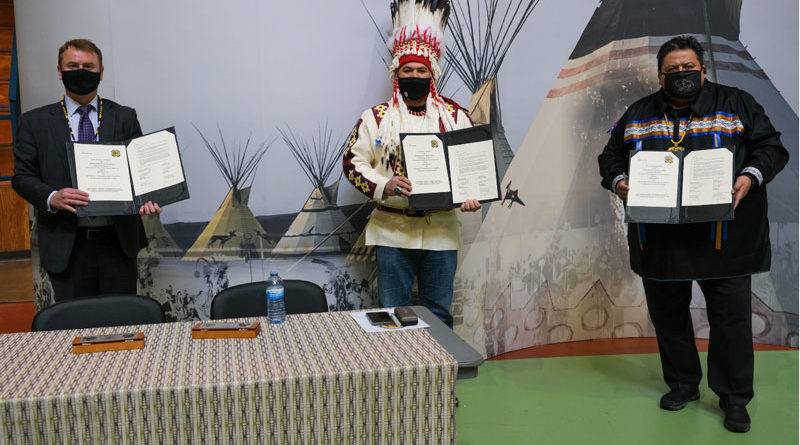Siksika and province sign health MOU
By Janet Kanters, Editor

Photo Courtesy of Siksika Health Services’ Communications Team
Alberta’s government has signed a memorandum of understanding (MOU) with Siksika Nation that supports work to improve health outcomes and services for Nation members.
Under the agreement, Siksika Nation and Alberta Health will work together to address and respond to gaps and issues with current health services, policies and programs.
“A tremendous strength of Siksika Nation is its extensive and effective range of health services,” said Chief Ouray Crowfoot, Siksika Nation, in a news release. “This relationship agreement with Alberta Health will further empower Siksika Nation to deliver comprehensive programming and services that are holistic, community-based, and put the health and wellness needs of Siksikawa first. Today’s signing represents an important step forward in Siksika Nation’s relationship with Alberta Health as we endeavour together towards equitable health outcomes.”
The MOU forges a relationship and partnership model between Alberta Health and Siksika Nation that will give the Nation increased control and access to quality health services, and an opportunity for government to explore innovative health services with a First Nation partner.
The MOU is the first agreement in Alberta to include the use of the Blackfoot language. The agreement also acknowledges Siksika Nation Elder’s Guiding Principles and seeks to combat racism, and bring about positive and transformative change in health care for Siksika Nation.
According to Tyler Shandro, the province’s health minister, the provincial government is committed to upholding the expectation that Alberta’s health-care system treats all patients with dignity and respect. “By creating meaningful relationships and listening to our Indigenous partners, I am confident we can work collaboratively with Siksika Nation to ensure community members can access culturally appropriate health services where and when they need them, both on and off reserve,” said Shandro in the release.”
The MOU establishes a process for ongoing assessment of Siksika Nation health needs and issues, and identifies realistic activities to resolve them. This will include reviewing existing programs, policies and services, and measuring current demand against capacity; developing action plans, which could include health-care infrastructure, programs, human resources and sustainability needs; and determining how to use available resources to achieve targeted health outcomes.
The term of the MOU is for up to five years, after which it will be re-evaluated by all parties.
